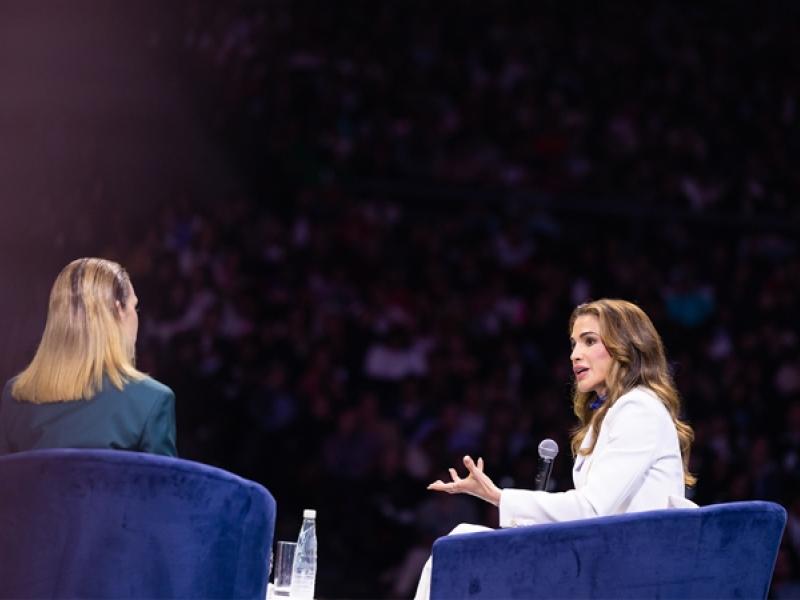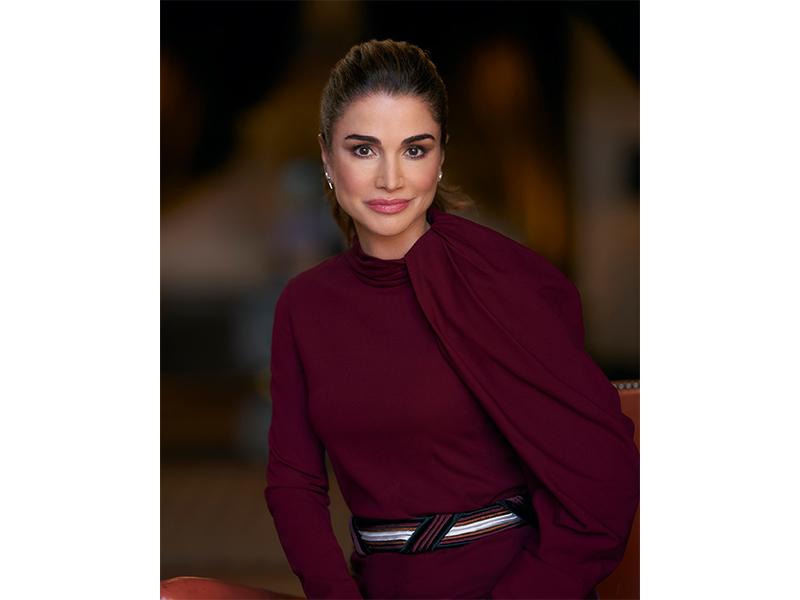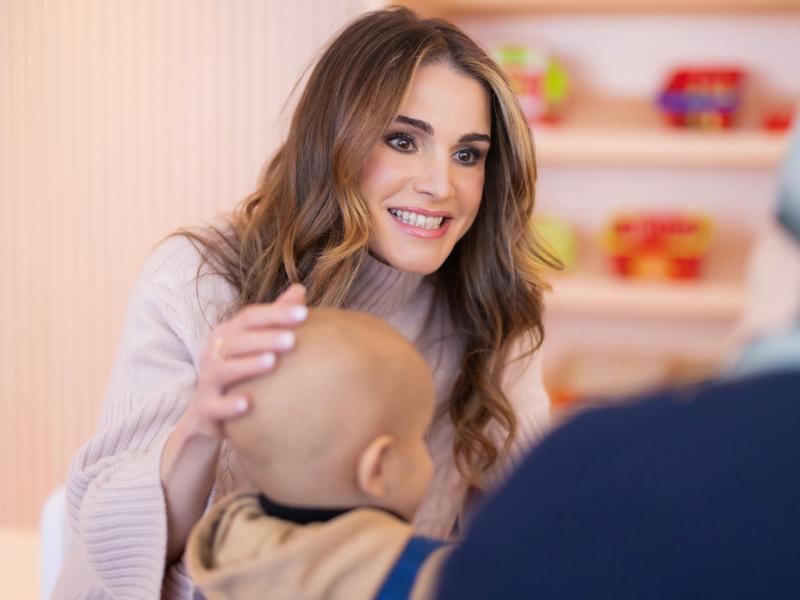It’s been five years now since you’ve been Queen. If you can go back to what it was like when you first, suddenly, knew that you would be the Queen of Jordan? What kind of a shock was that?
Queen Rania: Well, actually, it was a really huge shock and it was very daunting at the time. It was quiet freighting because it was suddenly thrust upon us, and we didn’t know at the time. I didn’t feel necessarily that comfortable to be able to handle and shoulder this huge responsibility. But I think, you take it day by day, you keep focusing on the larger picture and what you really want to achieve, and that’s the betterment for the Jordanian people and their livelihood, and with time I think we may build the confidence, and learn as you go along and try to make the right decisions at every juncture.
When you married into the Royal Family even though you did not know you would be Queen, you knew there were duties and responsibilities and being a public face.
Queen Rania: Right, there was a public face but it was more controlled if you will, because it was easier for me to maintain my private life as well, and I then think that it was really a great transition for us. We had an opportunity to lead pretty normal lives and we cherished those years. However, now that line between the public and the private life has become blurred. Yes, we still try very hard to maintain that family atmosphere in our home and to really stay very connected to our children and their lives and to provide as much normalcy as we possibly can.
And you’re still living, like driving you own car, and pick up your children, eat in restaurants, is that you saying: I want to have a normal life even if I am a Queen?
Queen Rania: That's just me being me, I don’t really think consciously about this. I just go about it as I normally do. And although so much has changed in my life in the last five years, I don’t feel that I personally changed, I am still very much the same person and I believe that’s important to stay connected to real life and not to become removed from society and from your environment. So it’s always very important to make sure that you continue to keep as much normalcy in your life as possible as you can.
You are still the Queen; people address you as ‘Your Majesty,’ what is your feeling to be a Queen? Not a lot of people have this experience in life, what is it to you to be a Queen?
Queen Rania: I really don’t know, because I don’t see myself that way. I mean, for me the title of a Queen means a certain responsibility. For me it’s a job, it means having to be aware of what is going on in my country, look at the people of Jordan and see how to improve their lives. It is not something that I carry, it does not change my personal life, it does not change who I am as a person, and I see it as a job title.
When you became Queen, at some point you must have realized, ‘I am now in a position which gives me influence, I can do something.’ What is it you want to do for Jordan? What is your vision for Jordan?
Queen Rania: Well, it is true that it does give you an opportunity to bring about change. My husband and I both share a common vision for Jordan. We think that Jordan could be a positive model for the rest of the region, a place where democracy and Islam coexist comfortably, where tradition and modernization exist together, where people have opportunities for the future and can realize their dreams and aspirations, where civil society is activated. This is our vision for Jordan and we’re both trying in whichever way we can to realize these dreams, hoping that we can set the successful model for Jordan.
Very modern ideas, but when you travel to rural areas of Jordan, even if you are in Amman you sometimes feel that Jordan is here, and you are way over there?
Queen Rania: Absolutely not, because to bring about real change you need this grassroots consensus, you need to bring about change in the mindsets of the people. So, all the political will on the top is not enough to bring about change. Whenever we talk about these plans we always make sure that we communicate them to the public, that the public are on board and feel they have ownership of this vision, and this is something that they want to do in order to benefit their own lives. Once you’ve built this broad grassroots consensus then we can really bring about change. Once people feel that they want to partake in the making of the future then they start working on it. It takes time, but it’s always important to realize that you have to communicate your vision to society.
When people say to you ‘Oh Queen Rania, that’s all very nice, but really that’s not Jordan, that sounds like a foreigner’s vision,’ what do you say?
Queen Rania: I say, why would you assume it’s a foreigner vision. I mean, I think we’re perfectly capable of coming up with something positive for our own country and we are perfectly capable of coming up with a model that take into consideration our own condition, our own traditions, religion, and circumstances and at the same time look at the modern world around us as Jordan, and come up with an equation that suits us as Jordan. It’s a Jordan model, some may want to say it’s westernized, some may not, but at the end of the day it’s Jordanian.
Where did you get this drive that you always want to change things, you want to step ahead for the next century, it is quite unique, not many people who share this. Where does that come from? In your up-bringing, Where?
Queen Rania I think it comes from a deep pride and passion for Jordan and anything Jordanian. I have a very strong love for this country and I think from that sense the feeling and desire to want to serve these people, and also the realization that there is so much that needs to be done. I want to leave behind for my children a better situation than what we have today and I think we all have to work very hard to make sure that we realize that.
We saw you when they presented the Ajloun master plan, they were basically saying ‘this is how we’ve always done this before and we’re going to do it again’ and you seem to say ‘no, we’re doing it differently’. Do you want to basically shake things up that you want to find new ways of doing things, and you’re going to basically push Jordanians to do it?
Queen Rania: I don’t think I am not here to cause a revolution, or to turn things upside down. I just like to see what they are doing and try to just encourage people to think in a different way. Sometimes you can get stuck in a certain way of doing things and not really think outside the box and I feel its my job to try to encourage people not necessarily think the traditional way but to look at other ways that could possibly be better and I found that people are always receptive to change if its done properly, if they see the positive side of it and the justifications for that, then they always come on board. We are not trying as I said, to change the good things that are here, I mean we build on the positive, but perhaps change some of the things that could be done better.
Do you wish you had more influence in the broader political sense?
Queen Rania: Actually not, I'm quite happy with the influence. It’s a very tough job and I'm not necessarily interested in power for the sake of power. It is a very big responsibility and I think what is more important is to stay focused on what you really want to do, your ultimate objective and that is to improve the situation for your people.
Sometimes you become mischievous, and think ‘ok fine they want to come and see how I look in this dress, then I’ll get millions from them to do something for Jordan.’
Queen Rania: If it is to Jordan then at the end of the day, it is about Jordan. Everything that I do or attend or any interview, wherever, at the end of the day, it’s always about trying to deliver something to Jordan.
After 9/11 you feel very strong that you also have a role to talk about Islam and what kind of a religion Islam is?
Queen Rania: Absolutely, I mean Jordan has always been a moderate country that has enjoyed good relations with many countries of the world, all over the world. We've always been, and I think we will continue to be, a bridge and a conduit for inter-religious and international dialogue and understanding. We will continue to play this role, we have to, and are continuously trying to break stereotypes about the Middle East and about Islam to try to really give a more accurate picture of what our faith and our people are about. To try to explain that at the end of the day, Muslims all over the world, the vast majority of them, aspire to the same thing that everyone else does. So, yes, this is a very important process, the communication, the dialogue, has to continue. As I said, ignorance is probably the biggest demon that we have in our world and it is kind of ironic because now we have so many tools available to us through technology, through the media, to really acquire information. Yes, we seem to be lacking in the knowledge that comes from personal interaction and communication. So, we really have to foster those kinds of contacts.
One of your initiatives is working with Arab woman leaders, do you also feel that you have a role there, to give women a voice, not just in Jordan but across the Arab world?
Queen Rania: Well, the fact is when it comes to women's issues I think our part of the world falls short in terms of women’s political empowerment and acknowledged participation. So, there is a lot of work that needs to be done in that field. I have definitely tried to change that kind of situations in Jordan to bring about more inclusion of women, to try to give them more access to opportunity and economic prosperity and I think it is very important to do that through talking about these issues, bringing them out in the open. Once you talk about them and you highlight them and people understand why it’s so important for women to have more of a role to play, then they will become convinced that we have to bring about change. We have to bring about this change not only for the sake of equity and giving women their basic rights, but also for the sake of society. Excluding women has really brought our societies back. It impedes the country's ability to draw on its best talent, so, it is a situation that really needs to be changed for the sake of the country as a whole not for the sake of women.
And in Jordan, you pioneered The National Council for Family Affairs. Is this you trying to have a more institutional role? That not only you care about things you want to make a difference, but is it a channel for you to actually get these views across and get the government to listen?
Queen Rania: It's not so much about having a channel for me as much as it is trying to have an umbrella that coordinates all the efforts related to women, children and other family issues, so that they are working together, that they have the same priorities and there is no duplication of efforts and, they’re sharing information. All that kind of corporation will bring about more change and will expedite the whole process of improving the situation. So, it's more about really bringing those organizations together under coordinated vision.
But you feel it’s moving in a positive direction, because some people would say that since 9/11 there has been a regression, more conservative Islam. Here in Jordan, we see more people wearing the veil now.
Queen Rania: Well, I don’t think the veil itself is symbol of extremism. This is a personal choice and I think that the mistake that some people make is that they look at these outward symbols as a manifestation of what somebody feels. There are certain elements such as conservative in the society, but there are also very strong moderate elements in Jordan. Jordan is a country that has a broad spectrum of people, and that’s what’s it’s about. It’s about diversity. And as long as everybody is accepting of each other's points of view and they are living together without any conflict then that’s the best balance.
Is it sad for you that you can't go regularly back to the north of the West Bank where you come from?
Queen Rania: It's sad, because in this day where borders are coming down and travel has become so easy for people, you have a situation now where walls are being built, and fortresses are being erected, and for people there is no freedom of movement there and I don’t think it's right in this day and age.
The ‘Hope Gap’ which you mentioned when you went to America to address a conference and, then Colin Powell picked it up and talked about it, did you get some satisfaction there, has it made some sort of a difference?
Queen Rania: I hope I can make a little bit of a difference. I think it is quite rewarding to feel that way, that you have tried to bring about some kind of positive change. But personally, it is not enough for me. It’s not about the recognition, it’s about really seeing a difference on the ground and what is really rewarding to me is to actually see practical changes in people's lives where they really feel that a certain project or initiative has really brought about a positive change in their lives. I think that is what’s most rewarding.
And then I saw you speaking at Injaz to the students. You seemed very animated, is that one of the areas where you like to work? Where you're talking to students, you were talking about political participation, getting them to be part of society?
Queen Rania: Well, of course youth are our future; almost 70% of our population are under the age of thirty so, they do represent our future and I always feel so energized when I talk to these young people because they are always so optimistic, they are always very hopeful and they have the candid spirit that I find very, very uplifting. They are also very open to ideas and to change in their lives, so they seem to catch on more than anyone else what kind of changes we're hoping to make for Jordan. They seem to grasp the vision very well.
© Copyright, BBC


